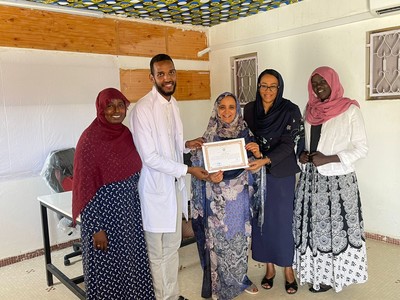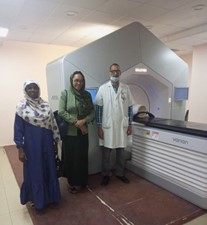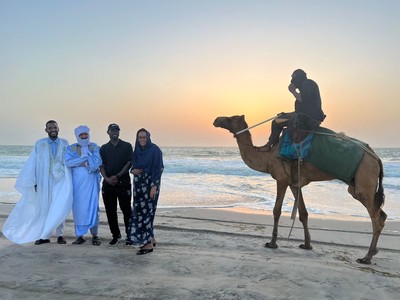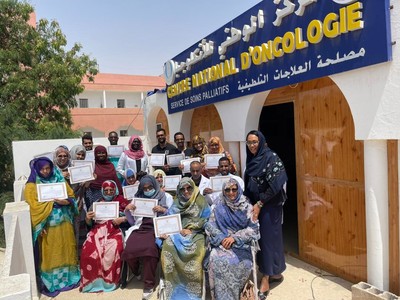
Blog: From the Sea to the Sahel: Palliative Care Lessons from Sudan and Mauritania
![]() Cairdeas
Cairdeas
![]() 11th April 2023
11th April 2023
This blog was written and submitted by Dr Nahla Gafer, a clinical oncologist at the Khartoum Oncology Hospital, Sudan. Today she shares about her recent visit to Mauritania and explains more about both Sudan and Mauritania.
Background
Dr Dave Fearon or "Dr Daveed" as he is called by Dr Ekhtelbenina Zein, director of the National Oncology Center (CNO), has been known as the first one to speak of and push for palliative care in Mauritania. This is our second invitation to Mauritania by Cairdeas Sahara. The first was in 2017 working with the volunteers at the community level and training general practitioners from different states (wilayat). Dr Dave Fearon has paved the way for this visit in order to impact the palliative care services at CNO. This time, we were three trainers from Sudan with more than 10 years of experience in palliative care for oncology patients.
Positive Aspects at the National Oncology Center
The administration and equipment exceed that of Sudan: the palliative care service has got a dedicated building, with dressing room, nurse office, counselling room, training area and offices for pharmacy, social worker, nutrition office and donating NGOs. All that in addition to the 8-bedded day care area. On the first day, we were met with the director of the hospital and the heads of the different departments. The director of the hospital struck us as amply knowledgeable and committed to providing palliative care to the patients in the center. Nouakchott Oncology Center, a 5 min walk from the Bureau of Palliative Services, provides high level radiotherapy treatments (3DRT, VAT and IMRT) as well as surgery (especially endoscopic), interventional radiology and targeted therapy.
Cultural Similarities
Across four countries in between (Sahel countries), and amongst the eleven neighboring countries for both, no two are so similar as Sudan and Mauritania in culture, nature, and landscape. With dress, for example, the thoub distinctive to married Sudanese ladies is almost the same malhafa, dressed by all Mauritanian ladies, though fixed in a different manner. Mauritania on the Atlantic Ocean is a bridge between North Africa and the Sub-Saharan Africa, as is Sudan facing the Rea Sea on the extreme east of the continent. Similar attire, similar traditions, similar gender roles, and almost similar beauty standards. Yet to reach such a country we had to travel northeast, leave Africa to Asia (Istanbul, Turkey) and then back southwest to reach Mauritania.
The South-South Interaction
Apart from the 12 interactive sessions given (for some candidates it was the first training they attend in palliative care), these were the highlights of the visit:
- Fostering a holistic responsibility for the patient by each of the team members
- Instilling the values of patient comes first, patient autonomy and patients’ rights, especially with the issue of families refusing the patient be told the diagnosis
- Working as a team and supporting each other
- Directing the financial aid according to socio-economic status
- Addressing spiritual issues (with rephrased questions in Arabic), which were previously ignored for two reasons: lack of insight by the patient, questions not adapted to Islam
- Implementing a summarized and simplified comprehensive four pages for PC clerking in Arabic (understood by the majority of the team members) compared to the French version which was 17 pages and with less than 50% of the team members able to write in French.
Future Plans
Unfortunately, the taboo surrounding cancer in Mauritania is so great that even asking about the symptoms is a problem. We, as a visiting team would like to co-ordinate further training of the treating physicians about breaking bad news, as well as an annual visit to improve the services – as mentioned by Dr Ekhtelbenina Zein, things can change step by step. Speaking more openly about cancer, we would like to help direct efforts for the early detection and screening, thus making use of the full services offered at CNO.
This two-week training period has opened the eyes of the staff to a lot of improvements that can be made. It is with such keen administration and caring personnel that positive changes are expected.
For us, as a visiting team, we have a lot to carry back to Sudan: this model of a stand-alone day care service; my colleague nurse who learnt how to prepare sessions and execute them in a conductive manner, and myself learning from the different aspects of care, especially becoming more proficient in convincing the families about patient’s right to know. It was great for them to attend the sessions conducted by Dr Mohja given in classical Arabic, while she made a second attempt to learn the Hassania dialect.
Many thanks to Cairdeas Sahara for making such a visit possible, with gratitude to Dr Dave Fearon and to the Mauritanian people.

Dr Benina Zein (in the center) handing Dr Mohamed Eleyatt (head of the PC team) the certificate after the 2 weeks training, together with the visiting team from Sudan - Sr Mahasin Ibrahim, Dr Nahla Gafer, and Dr Mohja Marhoom.

Oncologist Dr Ahmedou Tolba in front of a Halcyon Machine, with Sr Mahasin and Dr Nahla.

A photo out of the ward, with Dr Nahla Gafer pictured just in front of the sunset.

The doctors, nurses, social workers and nutritionists who attended the training together with the Director of CNO, at the Bureau of Palliative Services.
